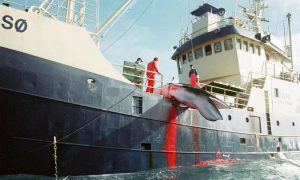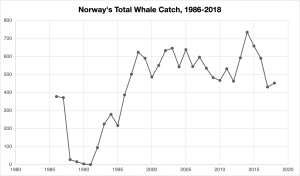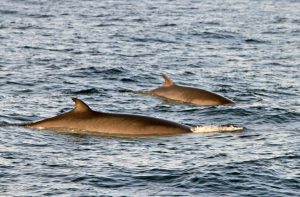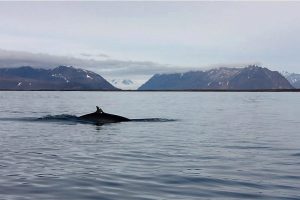 (France-Presse 1999)
(France-Presse 1999)
Norway is one of the few countries in the world that continues to whale (IWC 2019).
 (IWC 2019, self-produced table)
(IWC 2019, self-produced table)
The whaling debate in Norway
There are varied opinions on Norway’s continued whale practice. The Norwegian state believes that non-indigenous whaling should continue, but international environmental and animal-rights NGOs do not.
Pro-whaling: the Norwegian argument Norway argues that it should be allowed to continue to whale because of cultural and scientific factors. Norway has a long history of whaling dating back to the year 800 (Halverson 2004, 122), and whaling is an integral part of the cultural identity of small coastal whaling communities today (Halverson 2004, 145). Norway also argues that its whaling practices are sustainable—it can extract whales without negatively impacting the overall population (Ministry of Trade, Industry and Fisheries, 2018).
Anti-whaling: the NGO argument Many international environmental and animal-rights NGOs claim that Norwegian whaling is morally reprehensible. They argue that whales should not be killed because they are unique and remarkable animals (Bailey 2008, 297). NGOs have also argued that Norway does not need whale meat for subsistence (Altherr 2016, 7-11). They also claim that Norway’s whale-hunting methods are inhumane (Altherr 2016, 16).
These opposing arguments present a significant challenge to international cooperation. With these opposing viewpoints on indigenous whaling, how do we address these differences through policy? Watch this presentation to learn more:
[ensemblevideo version=”5.6.0″ content_type=”video” id=”be384a2c-8aff-4f48-8463-b4179bf89ede” width=”848″ height=”480″ displaytitle=”true” autoplay=”false” showcaptions=”false” hidecontrols=”true” displaysharing=”false” displaycaptionsearch=”true” displayattachments=”true” audiopreviewimage=”true” isaudio=”false” displaylinks=”true” displaymetadata=”false” displaydateproduced=”true” displayembedcode=”false” displaydownloadicon=”false” displayviewersreport=”false” embedasthumbnail=”false” displayaxdxs=”false” embedtype=”responsive” forceembedtype=”false” name=”Is non-indigenous whaling justified? Exploring the whaling debate in Norway – Rory Devlin”]
The International Whaling Commission Moratorium
As I explore in my presentation, the most significant policy effort to date to address the whaling debate is the International Whaling Commission’s moratorium on commercial whaling. The International Whaling Commission (IWC) is the premier international organization for the discussion of whaling issues. It passed a moratorium on commercial whaling in 1982 (Halverson 2004, 125). However, whaling states like Norway continue to whale even after the passage of the moratorium (Bailey 2008, 300).
Why wasn’t the moratorium effective?
Key whaling states felt shut out of the moratorium decision-making process (Stoett 63, 1997). The moratorium passed, but without the support of the whaling states that the moratorium was meant to regulate.
The IWC’s commercial whaling moratorium is an example of failed cooperation in the Arctic. Norway, a whaling state, was shut out of the whaling moratorium decision-making process, delegitimizing the moratorium in Norway’s view and rendering it ineffective. This case demonstrates the importance of uplifting relevant Arctic actors when making international policy decisions. The lessons learned from the IWC’s commercial whaling moratorium can be applied to other Arctic challenges. For example, the militarization of the Arctic (discussed in the previous tab on this website) might be best addressed by uplifting key actors like China and NATO.
 (NAMMCO, n.d.)
(NAMMCO, n.d.)
Policy recommendations
Engaging Norway in conversations about non-indigenous whaling has proved difficult—there are no easy answers. Here are two potential policy recommendations:
Whale conservation permit market Whale shares would be allocated to whaling and conservation groups. Whaling groups could hunt their share of whales, while conservation groups would let their share live. (Huang et al. 2017, 810).
“Waiting it out” In Iceland, a state like Norway that continued to whale after the passage of the IWC moratorium, non-indigenous whaling is on its last legs. A similar “phasing out” could occur in Norway (Mulvaney 2020).
Whether Norway follows a similar trend to Iceland is yet to be seen. If international cooperation continues to be evasive, “waiting it out” might be the only way to end the debate over non-indigenous whaling in Norway.
 (Norwegian Polar Institute, n.d.)
(Norwegian Polar Institute, n.d.)
Research notes
There are limitations to our knowledge of the anti and pro-whaling debate. Non-indigenous whaling was a particularly hot topic in the 1980s and 1990s. Therefore, contemporary scholarship on non-indigenous whaling in Norway is somewhat limited. There are gaps in our knowledge of how pro and anti-whaling actors frame their arguments and view the issue today.
This research relies heavily on the work of Jennifer Bailey, a professor of Sociology and Political Science at the Norwegian University of Science and Technology. Bailey’s work explores how Norwegian pro-whaling environmental groups and foreign anti-whaling environmental groups think about Norwegian whaling policy, as well as why the International Whaling Commission’s moratorium was ineffective (Bailey 2008, 2009).